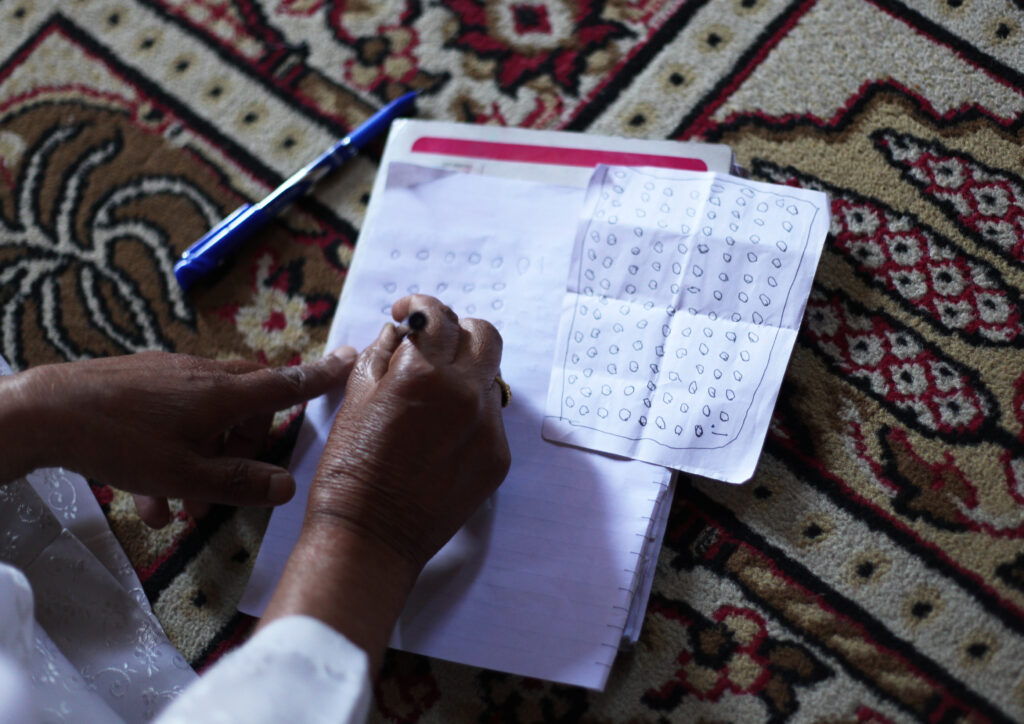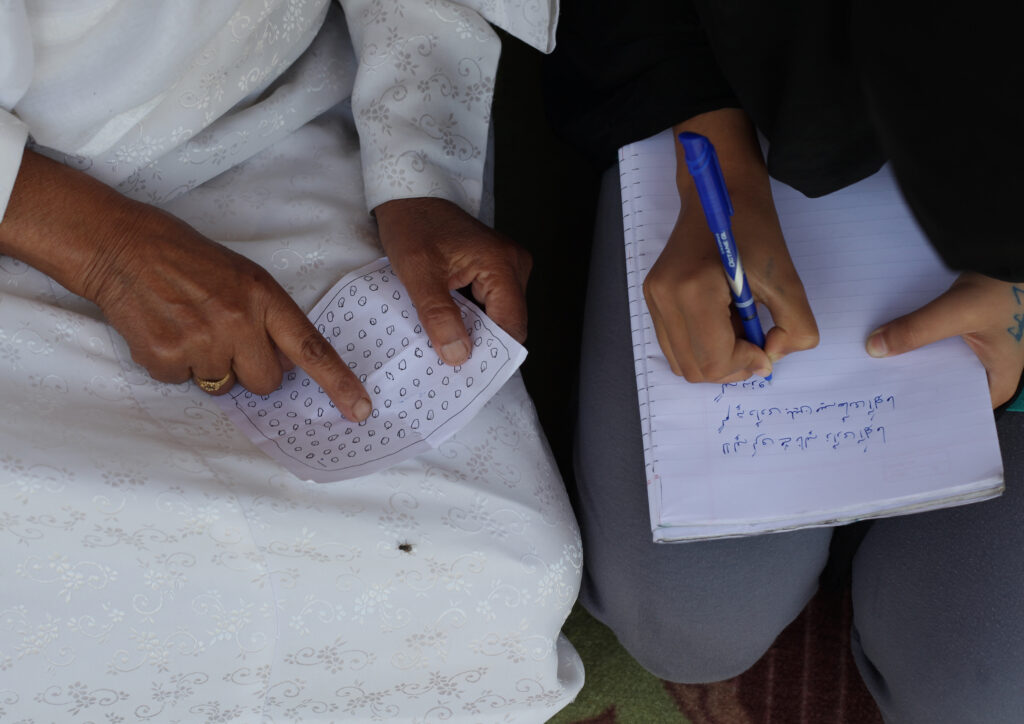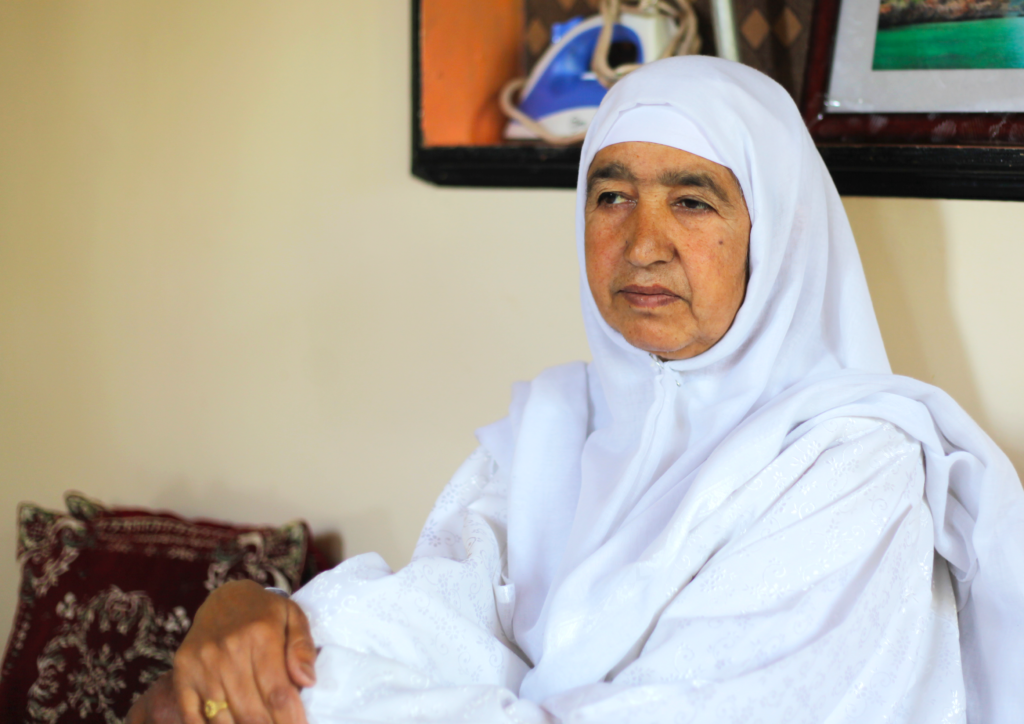Lost in creative contemplations with a pen in her right hand and a piece of white paper held in the left, she is creating her verses in the form of indistinguishable encoded circles. Only when they begin to flow seamlessly onto the paper, can she, or anyone wishing to enjoy her beautiful poetic verses, decipher what she has written and what those curiosity-driving circles mean to her.
Meet Zareefa Jan from Poshwari village of Naidkhai in north Kashmir’s Bandipora district, who has left the people of Kashmir in awe of her writing style for the last three decades. Her poetic journey has held her readers in thrall, leaving an indelible, yet enigmatic, mark on their minds.
No one has a whiff of the stories she has weaved in the pattern of circles that she has continued to draw on a countless number of pages. It is a unique style of writing that no human or technology has been able to understand, but when brought before her, it is as legible to her as a text written in any language known to most of us.
For avid readers, and listeners, of poetry, this will surely be an experience of a lifetime as this sexagenarian lady is weaving pure magic with her unique writing style. Learning about a never-heard-before poetry writing style from none other than the poetess herself, is, in itself, a fascinating experience.

Equally fascinating is watching Zareefa translate her thoughts into mystical encoded circles, a unique poetic language that has captivated readers for decades. Sample this:
“Peer hyun Rehbar saete gatie andar,
Seerie tass sarie bhaaw;
Yas’ne yeti peer senz zaan gayie war’e watie,
Kya karie dunhayas saath…”
(One should choose his guide to drive away darkness, One should reveal to Him the secrets; One who didn’t recognise His guide, What good would he bring to others)
In the above poem, Zareefa eulogises her spiritual saint aka Peer-o-Murshad, Masood(a) Saeb. Her Rehbar (Guide), she says, was the daughter of Musse’ Saeb of Tulmulla Ganderbal.
“Once I chose my guide, my Rehbar enjoined me with a particular invocation,” says Zareefa, who vividly remembers the days of her youth.
Sharing her experience, she narrates an incident: “The day when it first dawned on me was the time when I had gone to fetch water from a brook – Yaarbal.” It is the meeting place of friends; here, however, it means the low-lying place on the bank of a water body, especially a river or canal, where the women would go to fetch water.
She continues, “With a pitcher on my head, I was caught in a sort of trance. Struggling to get back home, I somehow managed and upon reaching, I, at once, got hold of a pencil and a paper and, out of nowhere, began writing – which, to others, may seem like just drawing circles because what I wrote appeared on paper in the shape of circles. But that was the moment I wrote for the first time.”
Continuing the story further, Zareefa shares, “Upon regaining my sobriety, I straightaway drove to my Murshad to narrate it. Murshad asked me if I had any objection with what I was endowed with. I only requested that I shouldn’t lose my sanity as I had a family to look after. Fortunately, my submission was entertained.”
Check out another of her beautiful verses that the poetess shares for us:
“Paan soraem aawum yaawunyeh,
Lalwun yetie thowtham naar;
Yaawun meune chambb dolwuneye,
Ye chui samsaar naa paidaar;
Gachie toure’ kyuith sulie sourunyeh,
Lalwun thowtham yetie naar…”
(I turned wine in my waning youth, burdened by my existence; My youth faded in this transient world; And made me seek solace in the Hereafter, as my existence became my burden).”
Now, 35 years down the line, Zareefa Jan continues to follow her unique style of writing her Kalaam. Recollecting life’s happenings, Zareefa speaks of her daughter, Kulsoom, who was roped in by the poetess-mother to textualise her writings. Kulsoom had done her MA in Arabic, and worked as a government teacher. Sadly, however, she could not be a part of her mother’s writing ritual for long, as she left for the heavenly abode soon after her marriage.
The unfortunate demise of her daughter pushed the mother into oblivion, making her distance herself from writing too. But then, the fire within rekindled and she continues penning her thoughts and feelings that lay beneath, in endless circles.
Carrying the legacy forward, Kulsoom’s daughter has stepped into her late mother’s shoes and has now become an invaluable part of her grandmother’s world of poetry. As the grandmother narrates, the little girl, a sixth standard student, translates it into text. And it goes on for endless hours in a single sitting, at times!
“Every time something comes to my mind, I jot it down in my own way, and there hasn’t ever been a single instance where I might have felt dissatisfied with what I write,” says the creator of enchanting poems.
Zareefa Jan shares the secrets of her encoded circles with her granddaughter, who, in turn, engages in the intricate process of decoding as her grandmother narrates the verses — a collaborative effort preserving a sacred tradition.
Over the years, the brilliant poetess has received acknowledgement and accolades from her contemporaries and acclaimed poets, including Shahbaaz Hakbaari, Farooq Adeeb, Ali Mohammad Nishtar, Mohtaaj Ganstaani, and Mushtaq Sumbli. Alongside her poetry, Zareefa has also been an active member of the ‘Science & Cultural Foundation Forum’, founded by Shahbaaz Hakbaari, which regularly holds symposiums.

Despite not being able to write a single word even in her native language Kashmiri, the unassuming and unlettered Zareefa, quite surprisingly, can understand English and Urdu languages. Her inability to write, nevertheless, has come at a huge cost as she has lost many of her written verses and can’t even recall any of them now. Fortunately, however, there are still some hundred poems with her, which are now in the process of getting published – both in text form as well as in Zareefa’s original, distinctive style of creating the verses.
“Wallai Shaam Sundri Boznai Sufiyaan,” she fondly remembers the lines narrated to her by a Pandit saint once when she was a child. With many people losing interest in literature, especially poetry, the magical Zareefa Jan is highly optimistic about the future of poetry, as she feels more and more people are getting inclined towards it.
Speaking highly of her life partner, the poetess acknowledges the immense support she received from her husband. “It would not have been possible for me to tread along had my husband in any way shunned me — because of the kind of art I got engaged with,” she says.
And by way of concluding our conversation, Zareefa Jan has a message for all of us: “One shouldn’t run after materialistic benefits; instead, look to earn respect through what one does.” Needless to say, the way she has lived her life and carried her art forward are testament to the fact that her actions and beliefs go together.

Well, for all those impressed by the jugglery of words by other poets, Zareefa Jan just ups the ante with not only her thoughts but also her mystic writing.
Here’s another mesmerising verse on love:
“Loole Kyn Nyezan Syeene Pyoum Darun,
Myah Pyou Tchaalun Zahre Almaas“
(I took the matters of love on my heart, and ended taking hemlock.)
Edited by: Arunima Maharshi & Shanti Nanisetti

